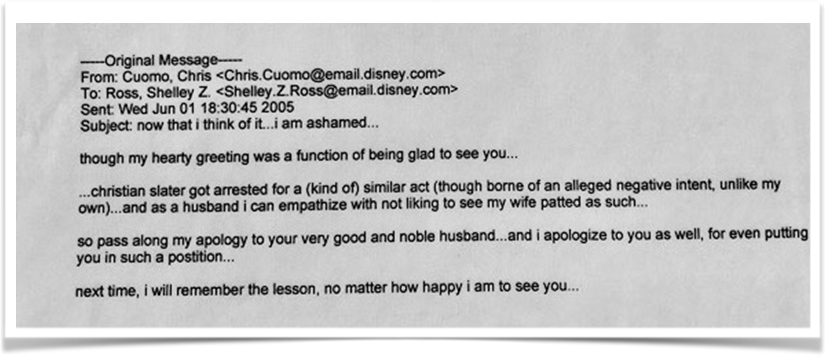On September 24, Shelly Ross, a television journalist and former executive producer at ABC and CBS, accused Chris Cuomo, in her opinion piece in The New York Times, of sexually harassing her at a colleague’s party in 2005.
Just before she became the executive producer of an ABC entertainment special, she was Cuomo’s executive producer at “Primetime Live.” Ross revealed that soon after her position switch, she encountered Cuomo at a going-away party for an ABC colleague where he sexually harassed her. In her essay, she described the incident and included that her husband witnessed it. When Cuomo arrived, he greeted Ross with a hug, followed by grabbing her butt. Cuomo stated he could touch her inappropriately now that she was not longer his boss, with the “kind of cocky arrogance” in his voice. Ross understood Cuomo’s actions weren’t in a sexual manner. She knew that it was meant to belittle and embarrass her as a woman in a high position.
Cuomo released a statement to The Times saying, “As Shelly acknowledges, our interaction was not sexual in nature. It happened 16 years ago in a public setting when she was a top executive at ABC. I apologized to her then, and I meant it.”
The day following the event, Cuomo apologized to Ross via email. He also asked that she apologize to her husband as well. Shelly mentions the apology in her article, but was weary of Cuomo’s sincerity. She questioned whether Cuomo was genuinely apologetic or simply ashamed her husband had caught him.
Ross acknowledged that she doesn’t want Cuomo to lose his job rather she wants to see “what accountability can look like in the #MeToo era” including his involvement during his brother, former Gov. Andrew Cuomo’s own sexual harassment accusations.
On his CNN segment, Chris Cuomo made a statement explaining that he was aware of his brother’s situation but he cannot cover it because they’re brothers. Cuomo noted that he has “always cared very deeply about these issues and profoundly so.” However, Cuomo was one of his brother’s advisors that helped through the crisis. The Washington Post also reported that Cuomo was involved in phone calls to discuss strategies on how the Governor should respond. Cuomo urged his brother to “take a defiant position” and to stand strong. With Andrew Cuomo’s case in the spotlight, attention was also on his confidantes. Many of Gov. Cuomo’s aides and advisors found themselves without jobs and taking significant blows after the dust settled.
Despite Chris Cuomo’s role in the situation, he faced no repercussions. CNN acknowledged that his actions were inappropriate and unprofessional but that there would be no consequences. On “Cuomo Prime time,” Chris Cuomo admitted to assisting his brother and described his “unique challenge and unique responsibility” of balancing journalism with a brother as a politician. His apology was directed towards CNN and his co-workers, saying he understood why his interaction was a conflict for them. He referred to it as “a mistake” because he put his colleagues in “a bad spot.”
Cuomo and CNN’s stark lack of accountability is highlighted in Ross’s essay. She calls them out and challenges them to respond better to the information she shared. Ross urges him and CNN to study and report on sexism, harassment and misogyny in the workplace, taking this issue as seriously as Cuomo claimed to. Ross and many others want accountability to have a new meaning, one that brings issues more attention instead of sweeping it under the rug.











